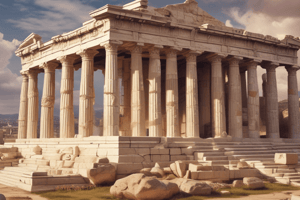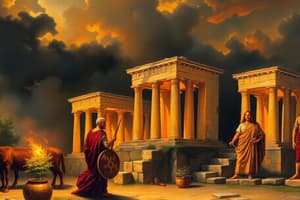Podcast
Questions and Answers
What were the two major city-states of ancient Greece?
What were the two major city-states of ancient Greece?
- Sparta (correct)
- Corinth
- Athens (correct)
- Thebes
What is Athens famous for?
What is Athens famous for?
Being the primary base of western civilization.
What values were emphasized in Athenian culture?
What values were emphasized in Athenian culture?
- Trade (correct)
- Cultural superiority (correct)
- Civic responsibility (correct)
- Military discipline
What education did wealthy males in Athens receive?
What education did wealthy males in Athens receive?
In Athens, women had significant rights and roles in government.
In Athens, women had significant rights and roles in government.
What was the social structure in Athens?
What was the social structure in Athens?
How did Athenian government evolve?
How did Athenian government evolve?
What was the population of Sparta approximately?
What was the population of Sparta approximately?
What aspect dominated Spartan culture?
What aspect dominated Spartan culture?
Describe the education system for boys in Sparta.
Describe the education system for boys in Sparta.
Spartan men were allowed to own businesses.
Spartan men were allowed to own businesses.
What rights did Spartan women have compared to other city-states?
What rights did Spartan women have compared to other city-states?
What government structure did Sparta have?
What government structure did Sparta have?
Flashcards are hidden until you start studying
Study Notes
Overview of Athens and Sparta
- Athens and Sparta were key city-states (poleis) in ancient Greece, each with distinct cultures and governments.
- No centralized capital in Greece; these city-states wielded significant power and influence.
About Athens
- Athens is recognized as a foundational hub of western civilization.
- Population growth from 475-430 BC rose from approximately 140,000 to 250,000 residents.
Values and Lifestyle in Athens
- Pursued a meaningful life focused on leaving a legacy.
- Emphasized intellectual pursuits, wisdom, and curiosity.
- Valued mind-body perfection, civic responsibility, and cultural superiority.
Education in Athens
- Boys, especially the wealthy, began education at age 5, varying by wealth.
- Older boys studied logic, philosophy, ethics, public speaking, and received military training; athletics were mandatory.
- Females did not have formal education but were taught domestic skills at home.
Women's Roles in Athens
- Women were primarily responsible for managing the household and child-rearing.
- Limited education and movement; involved in some religious rites but excluded from politics.
- Education was available only to Hetaerae, courtesans with more freedoms.
Social Structure in Athens
- Social hierarchy comprised freemen (all males), metics (outsiders), and slaves (lacking rights).
- Social classes included aristocrats, middle ranks, and the lowest class known as the Thetes.
Athenian Government
- Originated as a monarchy, transitioned to oligarchy/aristocracy around 700 BC.
- Experienced periods of tyranny before establishing a democracy.
- Acronym MOAT-D represents the government evolution: Monarchy, Oligarchy, Aristocracy, Tyranny, Democracy.
Spartan Facts
- Spartan population estimated at 100,000, with allies forming the Peloponnesian League.
- Conquered Messina in 725 BC, leading to the creation of helots for farming.
- Helot revolt occurred around 650 BC; military reforms established by Lycurgus.
Culture in Sparta
- Centered around military strength and discipline to suppress helots and maintain societal stability.
- Infants deemed unfit faced abandonment; healthy babies were raised to become strong warriors.
Lifestyle and Values in Sparta
- Focused on fitness and readiness for combat; discouraged personal expression.
- Valued duty, strength, and discipline over luxury; service to the state was paramount.
Education in Sparta
- Boys entered military training at age 7, which included reading, writing, and athletics.
- Harsh survival tests began at age 13, with boys left in the wilderness.
- Girls received education beginning at age 7, including gymnastics and survival skills.
Spartan History and Military Service
- Spartan men commenced military service at age 20 and remained soldiers until age 60.
- Non-citizen freemen handled trade and merchant jobs while citizen participation was mostly military.
Government in Sparta
- Governed by two hereditary kings, five ephors, a council of elders (Gerousia), and a lower legislative body (Apella).
- Power shifted from kings to a strong oligarchic regime over time.
Expectations and Rights of Spartan Women
- Compared to other city-states, Spartan women enjoyed greater independence.
- They received education and physical training similar to boys, could own property, and had roles in defending property.
- Some married arrangements included polyandry, emphasizing women's autonomy in family matters.
Studying That Suits You
Use AI to generate personalized quizzes and flashcards to suit your learning preferences.




